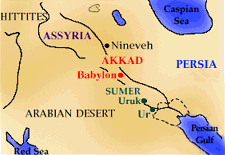 The land of Akkad was the northwestern neighbour of Sumer, the first major civilization of Mesopotamia and the cradle of script. It was located on the Euphrates and Tigris rivers upstream from Sumer, in the area of today's Baghdad (Iraq).
The land of Akkad was the northwestern neighbour of Sumer, the first major civilization of Mesopotamia and the cradle of script. It was located on the Euphrates and Tigris rivers upstream from Sumer, in the area of today's Baghdad (Iraq). The land of Akkad was the northwestern neighbour of Sumer, the first major civilization of Mesopotamia and the cradle of script. It was located on the Euphrates and Tigris rivers upstream from Sumer, in the area of today's Baghdad (Iraq).
The land of Akkad was the northwestern neighbour of Sumer, the first major civilization of Mesopotamia and the cradle of script. It was located on the Euphrates and Tigris rivers upstream from Sumer, in the area of today's Baghdad (Iraq).
For many centuries Sumerians and Akkadians, a semitic people, lived side by side. Akkadians had their own language, which belongs to the semitic language group and is thus related to Arabic, Hebrew, Assyrian and Babylonian. There is evidence that early in the third millenium BC some Akkadians moved into the more developed and prosperous Sumerian city-states; most names of the kings of Kish are Akkadian.
In 2334 BC king Sargon of Akkad conquered all of Sumer. His empire, known as "the Land of Sumer and Akkad", united the various city-states and reached as far as Lebanon.
Sargon ruled until 2279 BC. During his reign and in the years that followed the Akkadian language replaced Sumerian as the language for everyday life, although the use of the Sumerian language continued in written documents of religious and scientific character. The use of Sumerian cuneiform to write Akkadian texts became common during the next few centuries, and by 2000 Akkadian had completely replaced Sumerian both as a spoken and written language.
In 2125 BC the Sumerian city of Ur rose in revolt against the Akkadian regime, Sargon's dynasty came to an end, and the political structure of Sumer reverted to independent city-states.